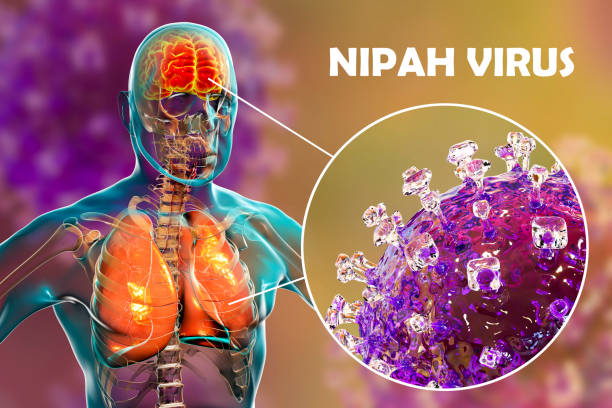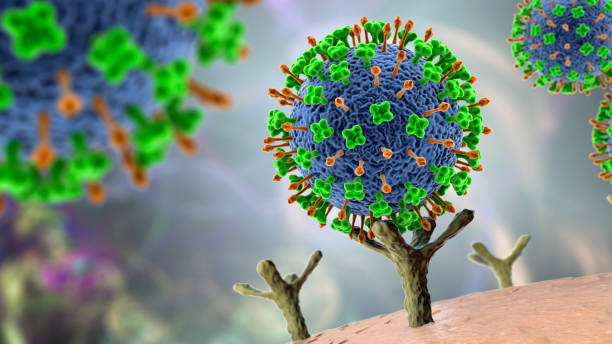Nipah virus, a rare but deadly zoonotic pathogen, has gained notoriety for its potential to cause severe outbreaks. Understanding Nipah virus treatment is crucial, especially in regions where it has been reported. In this article, we will delve into the details of Nipah virus treatment, including treatment options, prevention, and emerging research.
Nipah Virus: A Brief Overview
Nipah virus, belonging to the Henipavirus genus, primarily spreads from bats to humans through contaminated fruits or close contact with infected animals.

✅️ Nipah Virus Origin: Unraveling the Mystery of a Deadly Pathogen
It can cause a range of clinical presentations, from mild flu-like symptoms to severe respiratory and neurological issues. Due to its high mortality rate, Nipah virus demands immediate attention and appropriate treatment.
Symptomatic Care
- Supportive Care: Managing Nipah virus often involves providing supportive care. This includes ensuring adequate hydration, nutrition, and pain relief. Maintaining the patient’s comfort is paramount during treatment.
- Isolation: Patients diagnosed with Nipah virus should be isolated to prevent further transmission. Healthcare professionals should adhere to strict infection control measures.
- Antiviral Therapy: Currently, there is no specific antiviral medication approved for Nipah virus treatment. However, some experimental treatments, such as Ribavirin and Favipiravir, have shown potential in inhibiting viral replication. These drugs may be considered on a case-by-case basis under expert guidance.
Monoclonal Antibodies
- Monoclonal Antibodies: Recent research has explored the use of monoclonal antibodies as a treatment option. These antibodies are designed to target the Nipah virus and may prove to be an effective treatment strategy in the future.
Vaccination and Prevention
- Prevention is Better Than Cure: Given the lack of specific antiviral drugs, prevention becomes the key strategy in Nipah virus management. Vaccination efforts are underway to develop a safe and effective Nipah virus vaccine. Staying updated on vaccination campaigns is essential.
Emerging Research
- Emerging Treatments: Nipah virus is a subject of ongoing research, and scientists are actively seeking novel treatments. Gene therapies, CRISPR technology, and nanomedicine are being explored for their potential in combating Nipah virus.
Conclusion
Nipah virus treatment remains a challenging field due to the lack of specific antiviral drugs. However, supportive care and experimental treatments like antiviral medications and monoclonal antibodies offer hope.

✅️ Understanding Nipah Virus Transmission: How Does it Spread?
Prevention through vaccination and rigorous infection control measures is the best defense against Nipah virus outbreaks. As research continues to advance, we may soon have more effective treatment options to combat this deadly virus.
Stay informed, stay safe, and remember that early detection and immediate medical attention are crucial in managing Nipah virus infections.
FAQs on “Nipah Virus Treatment”:
1. What is Nipah virus treatment?
Nipah virus treatment refers to the medical interventions and therapies administered to individuals infected with the Nipah virus to alleviate symptoms and improve their chances of recovery.
2. Are there any specific antiviral drugs for Nipah virus treatment?
Currently, there are no specific antiviral drugs approved for Nipah virus treatment. Supportive care, including intravenous fluids and medications to manage symptoms, is the primary approach.
3. How is symptomatic treatment important in Nipah virus management?
Symptomatic treatment is crucial in Nipah virus management as it helps relieve symptoms such as fever, respiratory distress, and neurological issues, making the patient more comfortable during their illness.
4. Can you mention some of the common medications used in Nipah virus treatment?
Common medications used in Nipah virus treatment may include antipyretics (fever reducers), analgesics (pain relievers), and anticonvulsants (to manage seizures) as per the patient’s needs.
5. How does respiratory support play a role in Nipah virus treatment?
In severe cases, Nipah virus can cause respiratory distress. Respiratory support such as mechanical ventilation may be necessary to assist with breathing until the patient recovers.
6. Are there any experimental treatments or clinical trials for Nipah virus treatment?
Yes, there have been experimental treatments and clinical trials exploring potential therapies for Nipah virus. These trials may involve monoclonal antibodies, antiviral medications, and other innovative approaches.
7. What are the chances of survival with prompt Nipah virus treatment?
Early diagnosis and prompt initiation of treatment can significantly improve the chances of survival. However, the outcome may vary depending on the individual’s overall health and the severity of the infection.
8. How can healthcare professionals protect themselves while providing Nipah virus treatment?
Healthcare workers should follow strict infection control measures, including wearing personal protective equipment (PPE), to minimize the risk of contracting Nipah virus while caring for infected patients.
9. Is there a vaccine available for Nipah virus prevention and treatment?
Currently, there is no licensed vaccine for Nipah virus. Research is ongoing to develop vaccines that can potentially prevent Nipah virus infection and aid in its treatment.
10. What precautions should individuals take to avoid Nipah virus exposure?
Preventive measures include avoiding direct contact with sick animals, refraining from consuming raw date palm sap, and practicing good hand hygiene to reduce the risk of Nipah virus infection.
If you read this post or if you learned something new, please share it with your friends and followers on social media. You can share it on WhatsApp, Facebook, Instagram, Telegram, Pinterest, Twitter, Google NEWS, Google+, and other social media sites. You can also subscribe to my YouTube channel.

